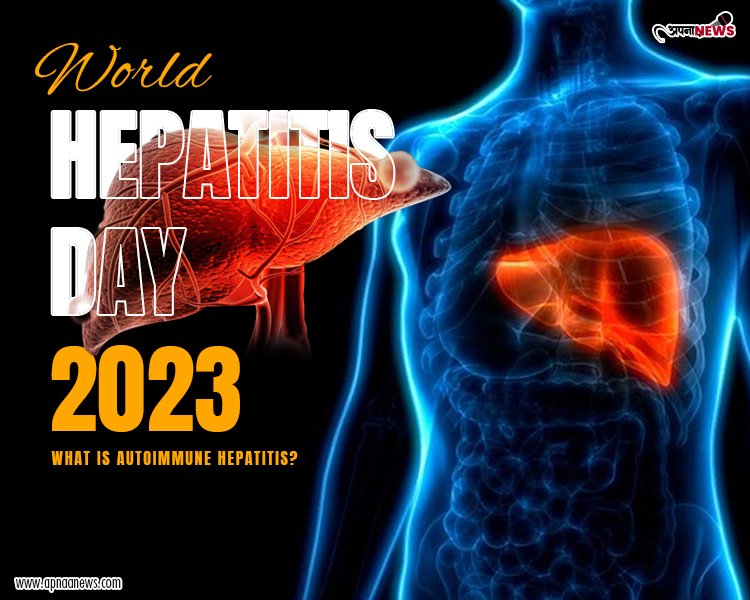World Hepatitis Day 2023: What is autoimmune hepatitis?
Celebrate World Hepatitis Day 2023 by learning about autoimmune hepatitis: a chronic inflammatory liver disease. Get the facts and join the fight against viral hepatitis.

World Hepatitis Day is annually commemorated on July 28th. According to the American National Institute of Health, the prevalence of autoimmune hepatitis is estimated to be between four to 43 cases per 100,000 adults and approximately two to ten cases per 100,000 children.
This condition is characterized by the immune system attacking the liver, leading to inflammation and potential long-term damage. Observing World Hepatitis Day helps raise awareness about this serious health issue and encourages efforts towards prevention, diagnosis, and treatment.
What is Autoimmune Hepatitis?
Autoimmune hepatitis (AIH) is a chronic liver disease marked by hepatic inflammation and injury resulting from an aberrant immune response targeting the body's own liver cells. Ordinarily, the immune system's role is to safeguard the body from pathogens such as viruses and bacteria.
However, in the case of autoimmune hepatitis, an erroneous recognition occurs, where the immune system erroneously identifies liver cells as foreign entities and initiates an immune attack against them. This immune-mediated assault leads to ongoing inflammation and damage within the liver.
- There exist two primary types of autoimmune hepatitis: Type 1 and Type 2.
- Type 1 autoimmune hepatitis: This variant represents the majority, accounting for approximately 80-90% of AIH cases, and has the potential to develop at any age. Notably, it often shows an association with other autoimmune disorders, such as rheumatoid arthritis or celiac disease.
- Type 2 autoimmune hepatitis: Less prevalent than Type 1, this form primarily affects children and young individuals. It is distinguished by the presence of specific autoantibodies in the bloodstream, which aid in its diagnosis and differentiation from Type 1 AIH.
Main Causes Of Autoimmune Hepatitis
The etiology of autoimmune hepatitis (AIH) remains incompletely understood, but it is believed to arise from a multifactorial interplay of genetic, environmental, and immunological factors. The primary causative factors associated with AIH are as follows:
- Environmental Triggers: While the exact environmental triggers of AIH have not been definitively identified, it is suspected that certain environmental factors might play a role in initiating the disease in individuals with a genetic predisposition. Viral infections, exposure to certain medications or chemicals, and other unidentified environmental factors have been implicated as potential triggers.
- Gender and Age: Autoimmune hepatitis shows a predilection for females, with a higher incidence observed in women compared to men. Additionally, while AIH can manifest at any age, it often presents between the ages of 15 and 40, although it can occur in both children and older individuals as well.
- Genetic Predisposition: There is compelling evidence suggesting a genetic component in the development of autoimmune hepatitis, as the condition often exhibits a familial tendency. Certain genetic factors may increase an individual's susceptibility to AIH. However, it is essential to recognize that the disease's pathogenesis is not solely determined by genetics, and additional factors contribute to its onset.
- Immunological Abnormalities: AIH is classified as an autoimmune disorder, characterized by the immune system's erroneous recognition of the body's own liver cells as foreign entities. This leads to an immune response that involves the production of autoantibodies and immune cells that attack the liver. The specific immune dysregulation responsible for AIH is not fully understood, but it contributes to the chronic inflammation and damage to the liver.
How to Prevent Autoimmune Hepatitis
- Autoimmune Hepatitis can be prevented but it depends on which type of hepatitis you are suffering. Basically there are 5 types of hepatitis namely - A,B,C,D,E.
Prevention should be take according to the type of Hepatitis as Follows:
1.Hepatitis A
- Vaccination: The hepatitis A vaccine is highly effective in preventing hepatitis A infection. It is strongly recommended for individuals at higher risk, such as travelers visiting regions with a higher prevalence of hepatitis A, healthcare workers, and individuals with chronic liver disease.
- Hand Hygiene: Practicing proper hand hygiene is crucial in preventing the spread of hepatitis A. Thoroughly washing hands with soap and water for at least 20 seconds should be done after using the bathroom, before preparing or eating food, and after changing diapers or handling waste.
- Food and Water Safety: Being cautious about food and water consumption is essential, especially in areas with inadequate sanitation. To prevent hepatitis A transmission, it is advisable to choose bottled water or boiled water, avoid consuming raw or undercooked foods, and opt for food establishments with good hygiene practices and reputable sources.
2.Hepatitis B
- Vaccination
- Safe Sex Practices
- Avoid Sharing Needles
- Be Cautious with Body Fluids
3.Hepatitis C
- Avoid Sharing Needless
- Practice Safe Sex
- Ensure Safe Medical Procedures
4.Hepatitis D
- Vaccination
5.Hepatitis E
- Avoid Contaminated Water
Symptoms of Hepatitis
The symptoms of hepatitis can vary depending on the type of hepatitis and the stage of the infection. Here are the common symptoms associated with acute viral hepatitis (hepatitis A, B, C, D, and E):
- Fatigue: Feeling excessively tired and lacking energy is a common early symptom of hepatitis.
- Jaundice: Yellowing of the skin and eyes is a characteristic sign of hepatitis. It occurs when the liver is unable to process bilirubin properly, causing its buildup in the blood.
- Loss of Appetite: Hepatitis can lead to a reduced appetite and weight loss.
- Nausea and Vomiting: Many people with hepatitis experience nausea and may vomit.
- Abdominal Pain: Some individuals may have pain or discomfort in the upper right side of the abdomen where the liver is located.
- Fever: Fever is a common symptom of acute hepatitis, especially during the initial phase of infection.
- Joint and Muscle Pain: Hepatitis can cause generalized aches and pains in the joints and muscles.
- Dark Urine: The urine may appear dark or tea-colored due to the presence of bilirubin.
- Pale Stools: Stools may become pale or clay-colored due to reduced bile flow.
- These Symptoms you might face while suffering hepatitis.
Conclusion
Hepatitis Day, observed annually on July 28th, serves as a significant global awareness campaign to highlight the impact of hepatitis on individuals and communities worldwide. The day aims to raise awareness about the different types of viral hepatitis, including hepatitis A, B, C, D, and E, and their prevention, diagnosis, and management






